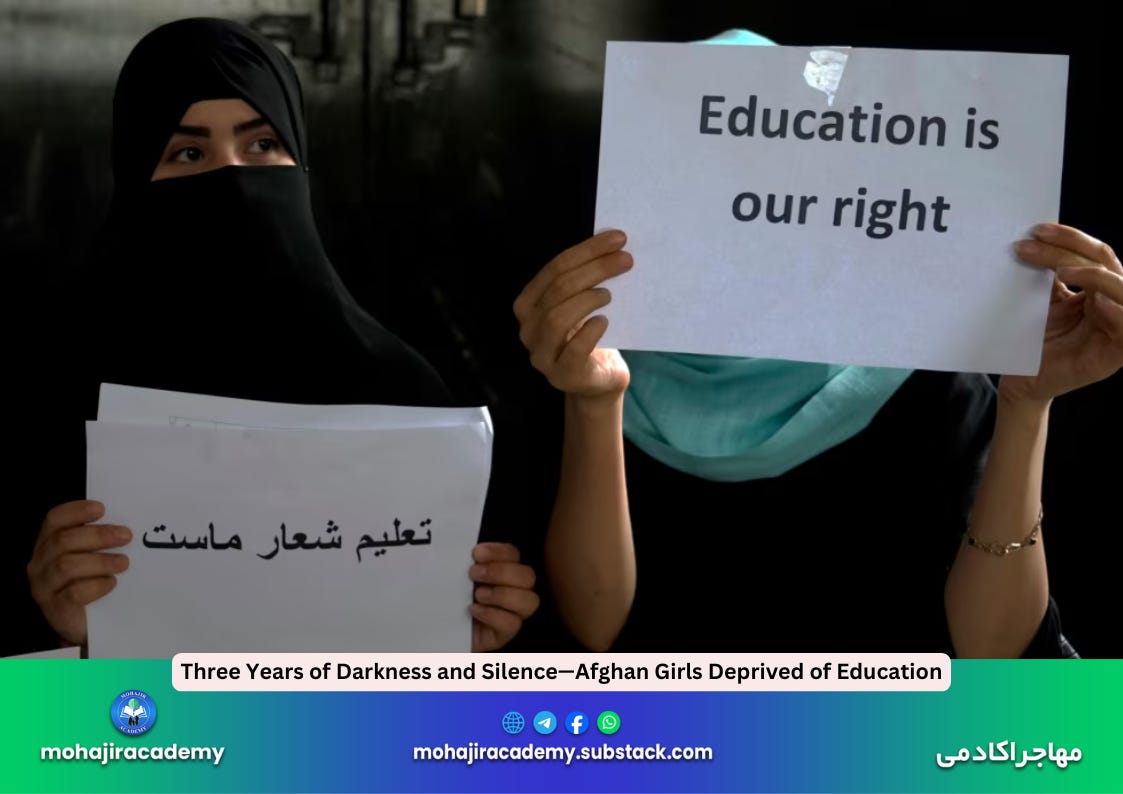Three Years of Darkness and Silence—Afghan Girls Deprived of Education
Silent and shuttered schools, empty universities, and shattered dreams stand as grim reminders of an ideology that has extinguished the aspirations of an entire generation
By: Zahra.B
Education, one of the most fundamental human rights, has become an unattainable dream for millions of Afghanistani girls. Since the Taliban took control of Afghanistan in August 2021, girls’ education has been gradually banned. While the world watches this humanitarian crisis unfold, the educational and professional future of a new generation of Afghan women and girls remains uncertain.
The United Nations Children's Fund (UNICEF) has warned that if this ban continues until 2030, more than four million girls will be denied their right to education. Beyond its devastating impact on individuals, this crisis will have catastrophic consequences for Afghanistan’s economy, healthcare, and social future.
Closed Schools and Shattered Hopes
In 2021, when the Taliban seized Kabul, many female students feared the beginning of a new era of darkness and silence for women and girls. Their fears were soon realized as successive decrees led to the closure of schools and universities for girls. From secondary schools to higher education institutions, the Taliban systematically barred girls from studying under various pretexts.
Fariba, an 11th-grade student who was forced out of school, now finds herself confined to her home. “At first, we thought this was temporary,” she says. “But with each passing day, our hope for the future fades. I no longer know if I will ever attend university.” According to UNICEF, Afghanistan is the only country in the world that has banned girls from secondary and higher education. The consequences of this policy extend far beyond students, pushing the entire country toward profound social and economic crises.
Repressive Policies and Tightened Surveillance on Women and Girls
The Taliban have not only shut school doors to girls but have also severely restricted all forms of informal education. Private educational institutions that sought to provide learning opportunities for girls have faced security threats and repeated intimidation, forcing many to shut down. Nargis, a former teacher at a private school, describes the repression: “We tried to hold secret classes, but the Taliban threatened us with severe punishment if we continued. Many of my colleagues were forced to leave both their schools and the country.”
According to United Nations reports, the decline in female students has led to a rise in child marriages, posing serious risks to the health and well-being of young girls. Additionally, the ban on education has drastically reduced the number of female doctors and midwives, leaving Afghan women and girls without essential medical services. UNICEF has warned that this situation could lead to the deaths of 1,600 mothers and over 3,500 newborns in Afghanistan.
Educational Migration: The Only Path to Salvation
With schools and universities closed to them, many Afghanistan girls see migration as their only option. Countries such as Pakistan, Iran, and some European nations have become destinations for Afghan female students seeking education and an escape from the darkness. However, migration comes with its own set of challenges, particularly for students and young people. Roya, a former Kabul University student now living in Pakistan, shares her struggle: “When I realized I could no longer study in Kabul, I decided to leave. But even here, things are not easy. High costs, lack of financial support, limited access to universities, and police harassment of migrants make everything difficult.”
The Global Community’s Deadly Silence
Despite widespread protests inside and outside Afghanistan, the international community has taken no effective action to pressure the Taliban into reopening girls’ schools. Some countries have suspended financial aid to Afghanistan, making it conditional on reopening schools, yet the Taliban remain unwavering in their stance.
Catherine Russell, Executive Director of UNICEF, issued a warning in a statement released on Saturday, March 22, 2025. She emphasized that if the rights of young girls continue to be ignored, this decision's consequences will also affect future generations. According to her, banning women's education not only weakens Afghanistan's healthcare and economy but also pushes the country into long-term stagnation.
Conclusion
Three years into Taliban rule, millions of Afghanistani girls remain deprived of their most fundamental right—education. Silent and shuttered schools, empty universities, and shattered dreams stand as grim reminders of an ideology that has extinguished the aspirations of an entire generation. UN reports indicate that if this situation persists, Afghanistan will not only lose a generation of educated individuals but will also face severe economic, healthcare, and social crises.
This is the tragic story of thousands of girls who, with tear-filled eyes, have put their books aside and are forced to remain at home while the world remains silent in the face of this educational oppression. But silence cannot last forever; Afghanistan’s future without educated women and girls is doomed to collapse—a reality the world must not ignore.





